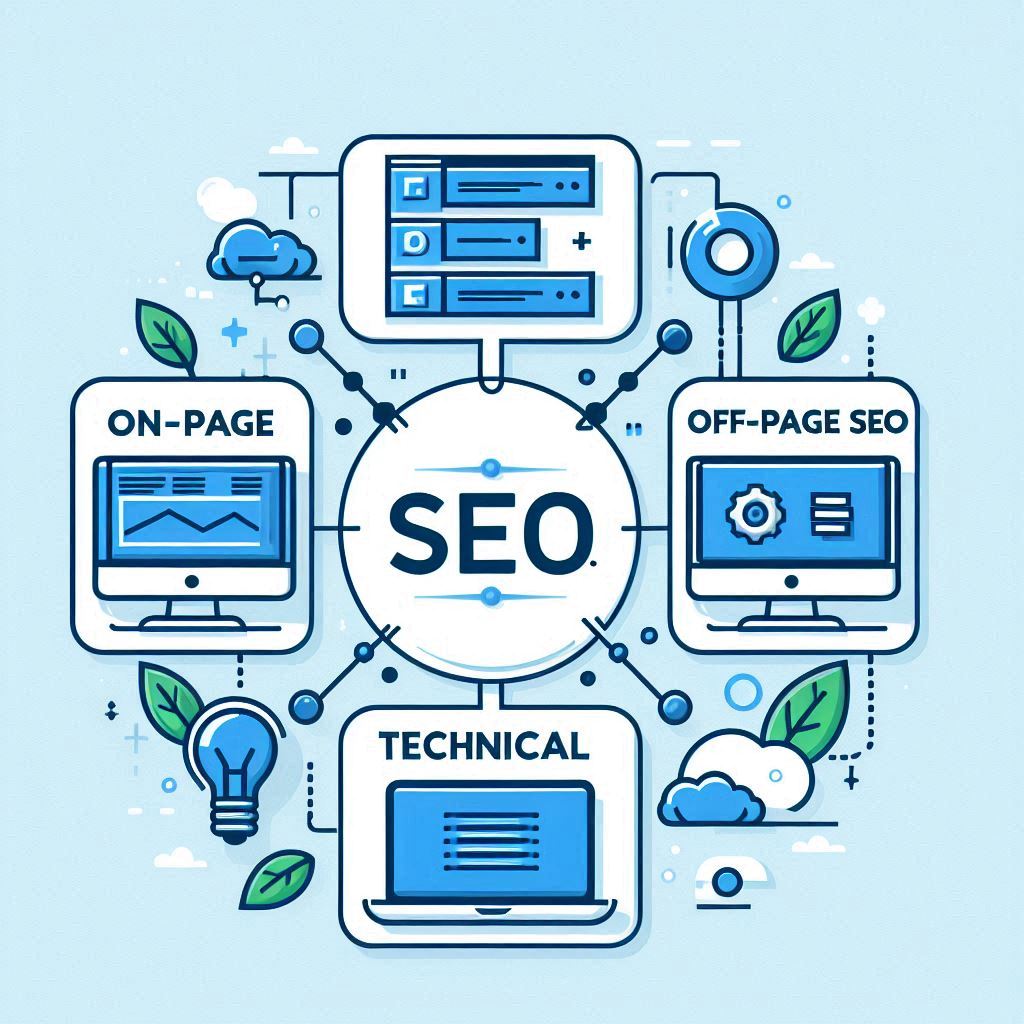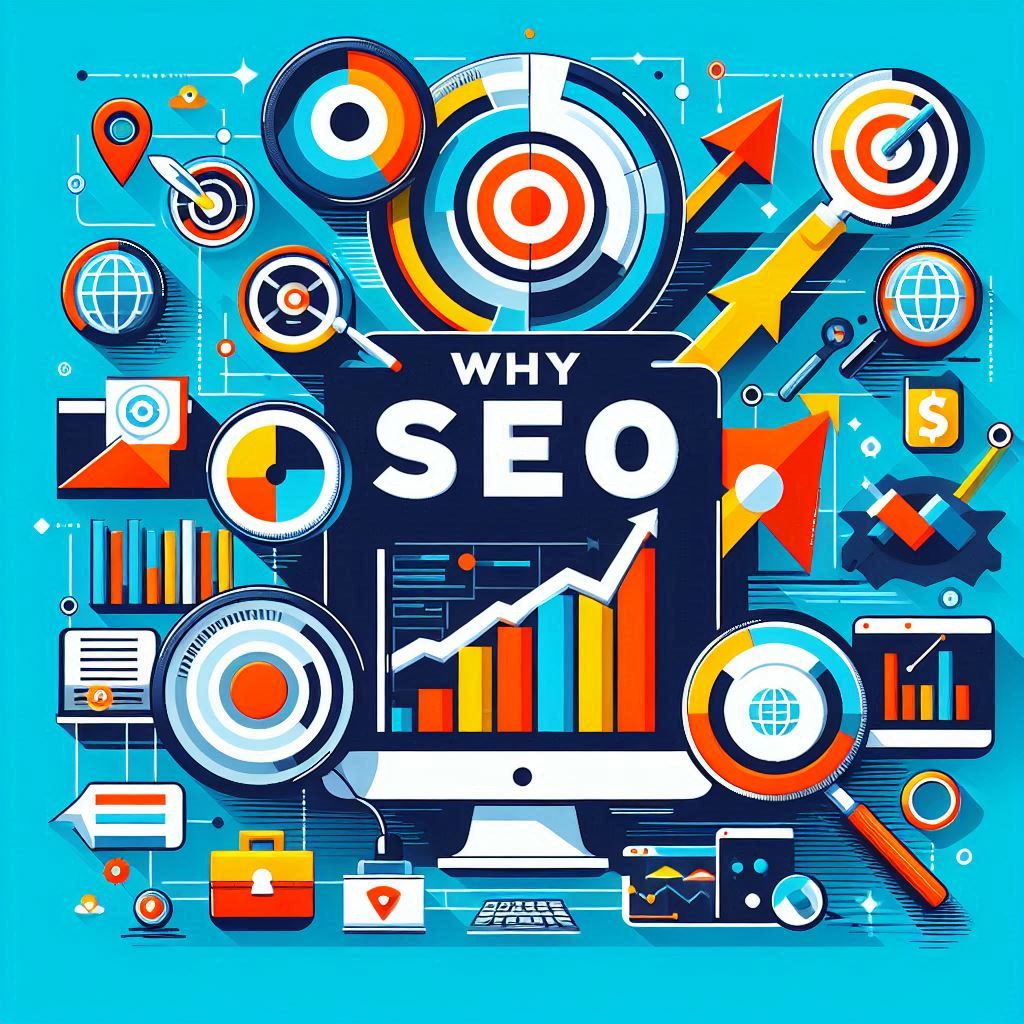Different Types of SEO and Their Importance for Business

SEO, or Search Engine Optimization, is not a one-size-fits-all approach. It encompasses several types, each tailored to enhance a website’s presence and performance on search engines in unique ways. Understanding these types and their evolution is key to effectively leveraging SEO across various industries.
1. On-Page SEO
Definition: On-Page SEO involves optimizing the content and HTML source code of individual pages on your website to make them more appealing to search engines and users. This includes optimizing elements like meta tags, headers, internal links, content quality, and URL structure.
Why It Matters:
- Content Relevance: By optimizing content for relevant keywords, On-Page SEO ensures your pages match what users are searching for, helping to increase visibility and click-through rates.
- Meta Tags and Headers: Proper use of meta tags and headers not only improves your rankings but also enhances user experience by making your content more accessible and understandable.
Evolution Over Time: Initially, On-Page SEO was primarily about keyword density and placement. However, search engines have since become smarter, focusing on content quality, user intent, and overall user satisfaction. This shift means that creating valuable, well-organized content is more important than ever.
2. Off-Page SEO
Definition: Off-Page SEO refers to actions taken outside of your website that affect your rankings on search engines. This includes tactics like link building, social media engagement, and earning backlinks from reputable sites.
Why It Matters:
- Link Building: Acquiring high-quality backlinks from reputable websites acts as a vote of confidence, signaling to search engines that your content is credible and authoritative.
- Brand Mentions and Social Signals: Being mentioned by reputable sites or having a strong social media presence can boost your site’s visibility and credibility.
Evolution Over Time: In the past, Off-Page SEO was often about quantity over quality, with many marketers using tactics like link farms and spammy backlinks. Today, the focus is on acquiring high-quality, relevant backlinks that genuinely add value and authority. Search engines now prioritize natural, organic links and penalize manipulative practices.
3. Technical SEO
Definition: Technical SEO involves optimizing the technical aspects of your website to help search engines crawl, index, and rank it more effectively. This includes improving site speed, mobile-friendliness, secure connections (SSL), and implementing structured data.
Why It Matters:
- Site Speed and Mobile Optimization: Faster loading times and a mobile-friendly design are crucial for user experience, which search engines now use as key ranking factors.
- Structured Data: Using structured data helps search engines better understand your content, potentially leading to enhanced search results like rich snippets.
Evolution Over Time: Originally, Technical SEO focused mainly on making sure a website was crawlable and indexable by search engines. However, with the introduction of Google’s Core Web Vitals, the emphasis has shifted towards ensuring websites offer a smooth, fast, and user-friendly experience.
4. Local SEO
Definition: Local SEO is all about optimizing your online presence to attract more business from relevant local searches. It involves optimizing your Google My Business profile, building local citations, and creating localized content.
Why It Matters:
- Local Visibility: For businesses that rely on local customers, appearing in local search results is crucial. Local SEO helps businesses show up in local searches, driving traffic from nearby users.
- Google My Business and Local Citations: Optimizing these elements helps improve local search visibility, leading to more local traffic and potential customers.
Evolution Over Time: Local SEO has gained importance with the rise of mobile searches and the growing trend of consumers looking for nearby businesses. Google’s algorithm updates, like the Pigeon update, have placed more emphasis on local search results, making local SEO a must for businesses serving specific geographic areas.
5. Content SEO
Definition: Content SEO is the practice of creating and optimizing content to rank higher in search engine results. This includes crafting engaging blog posts, articles, videos, infographics, and other content forms that meet user needs and search engine algorithms.
Why It Matters:
- Engagement and User Retention: High-quality, engaging content encourages visitors to stay longer on your site, reducing bounce rates and improving your site’s authority.
- Keyword Targeting and Fresh Content: Well-optimized content attracts relevant traffic, while regularly updating your site with fresh content signals to search engines that your website is active and valuable.
Evolution Over Time: Content SEO has evolved from stuffing pages with keywords to focusing on comprehensive, high-quality content strategies. Search engines now prioritize content that genuinely answers user queries and provides value. With the rise of voice search and AI, there is an increased emphasis on natural language and understanding user intent.
6. E-Commerce SEO
Definition: E-Commerce SEO is the process of optimizing online store websites to attract more traffic and improve sales. It includes optimizing product pages, category pages, and overall site structure.
Why It Matters:
- Product Visibility: E-Commerce SEO ensures that your products appear in relevant search results, increasing the likelihood of attracting buyers ready to make a purchase.
- Optimized User Experience: Focusing on site navigation, speed, and usability improves not only SEO but also conversion rates, making your online store more effective.
Evolution Over Time: As e-commerce has expanded, E-Commerce SEO has become more complex. Factors like user reviews, product availability, and detailed descriptions now influence rankings. Additionally, competition on platforms like Google Shopping and Amazon has made it crucial for online retailers to have a robust SEO strategy to stand out.
How SEO Has Evolved
SEO has come a long way from its early days of keyword stuffing and link farming. As search engines have become more sophisticated, the focus has shifted towards providing real value, enhancing user experience, and building genuine authority. Today, SEO is about creating a holistic strategy that incorporates technical optimization, quality content, ethical link building, and user engagement.
Each type of SEO plays a unique role in enhancing a website’s visibility, credibility, and performance. As search engines continue to evolve, staying up-to-date with the latest SEO practices is essential for businesses looking to succeed online. By understanding and implementing these types of SEO, you can effectively reach your target audience, build trust, and drive long-term growth.

